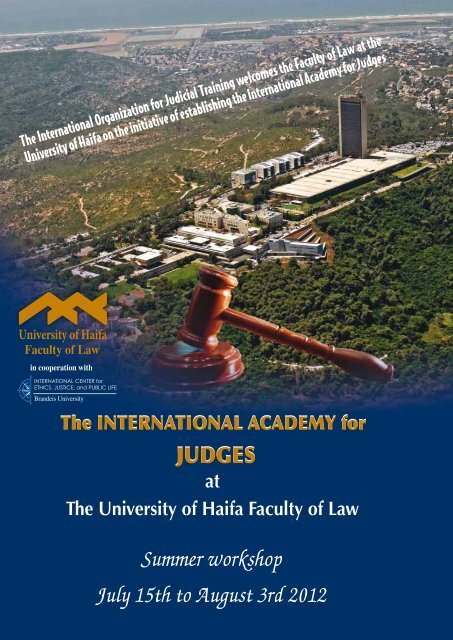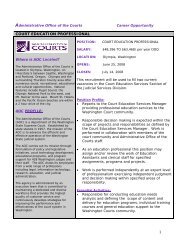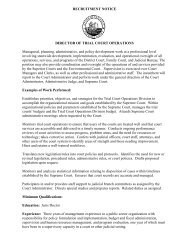You also want an ePaper? Increase the reach of your titles
YUMPU automatically turns print PDFs into web optimized ePapers that Google loves.
Faculty of Law<br />
in cooperation with<br />
INTERNATIONAL CENTER for<br />
ETHICS, JUSTICE, and PUBLIC LIFE<br />
Brandeis University<br />
The INTERNATIONAL ACADEMY for<br />
JUDGES<br />
at<br />
The University of Haifa Faculty of Law<br />
Summer workshop<br />
July 15th to August 3rd 2012
The INTERNATIONAL ACADEMY for JUDGES<br />
The International Academy for Judges was established to support the professional development of the<br />
judiciary and to engage in research related to judging and the judiciary. The Academy is planning to<br />
create and develop a cadre of professional judges and scholars that will be able to systematically research<br />
and inform discourse on professional judging and produce scholarly and policy recommendations. By<br />
doing so, the Academy will respond to urgent needs at the intersection of legal practice and academic<br />
scholarship.<br />
One of the main activities of the academy is an annual three-weeks workshop exclusively geared for<br />
judges from around the world in which three courses will be offered. The courses will be taught by top<br />
academics and judges, creating a forum in which the participating judges would be able to share their<br />
national experiences with fellow judges and the instructors. This would present a rare opportunity to<br />
get a taste of contemporary academic legal discourse and analysis. In addition a weekend workshop of<br />
international & national Judges will be offerd to the participants.<br />
Academic Directors<br />
Professor Amnon Carmi, a former judge, is a Professor (emeritus) at the Faculty of Law and the former<br />
Secretary-General of the International Organization for Judicial Training (IOJT). Among other<br />
numerous international appointments, he was the President of The World Association for<br />
Medical Law, the Editor-in-Chief of Medicine and Law, International journal and of International<br />
Medicolegal Library and holds a UNESCO Chair in Bioethics.<br />
Professor Eli M. Salzberger, the former Dean of the University of Haifa Faculty of Law and a prominent<br />
expert on legal theory and the study of the judiciary. He was the President of the European<br />
Association of Law and Economics, and was a member of the board of directors of the<br />
Association for Civil Rights in Israel and the public council of the Israeli Democracy Institute.<br />
The University of Haifa Faculty of Law<br />
The Faculty of Law at the University of Haifa is one of Israel’s leading law schools. It was founded<br />
upon an interdisciplinary philosophy of academic studies, focusing on public law, human rights and civil<br />
rights, and developing cutting-edge research areas such as Law and Technology, Law and Economics,<br />
Law and Society and Empirical Legal Studies. The Law Faculty offers a wide variety of boutique programs<br />
specializing in global legal education, including specialized Master’s programs for international students,<br />
Master’s programs in Law and Health, Adjudication and Criminal Procedure; a joint Master’s program with<br />
the University of Ottawa, An Erasmus Mundus Master’s program in Law and Economics (in cooperation<br />
with other European universities) and an International Master’s program in Patent Law, in collaboration<br />
with the World Intellectual Property Organization (WIPO).<br />
The Faculty of Law has developed an expertise in the academic training of judges. Since 2004 the Faculty<br />
has been running a successful, one-of-a-kind Master’s program for Israeli judges in cooperation with the<br />
Institute of Israeli Advanced Judicial Studies. More than 15 percent of all judges in Israel have already<br />
graduated from this unique LL.M program.
The Summer Workshop<br />
Academic Program<br />
Dates: 15 th July–3 rd August, 2012<br />
120 academic hours in a degree track towards an LL.M degree or in a certificate track.<br />
Teaching staff includes leading experts and legal scholars from around the world, among them:<br />
Professor Aharon Barak (Former President of the Israeli Supreme Court), Professor Yochai Benkler<br />
(Harvard Law School), Professor Irvin Cotler (Former Minister of Justice in Canada), Professor Dieter<br />
Grimm (Former judge of the German Constitutional Court and Humboldt University), Professor Neil<br />
Netanel (UCLA Law School), Justice Eliezer Rivlin (Deputy President of the Israeli Supreme Court) and<br />
Professor Joseph Weiler (NYU Law School).<br />
Three courses will be offered:<br />
Comparative Constitutional Law I<br />
(Coordinator: Dr. Amnon Reichman. The Faculty of Law, University of Haifa)<br />
Is comparing constitutional jurisprudence across jurisdictions a legitimate exercise of interpretation,<br />
or does it run afoul of basic democratic principles? Is learning – and borrowing – from constitutional<br />
doctrine developed in other jurisdictions a part of the jurist’s duty, or does it undermine domestic<br />
sovereignty? And if legitimate, what practical and theoretical lessons that can be drawn from the<br />
different constitutional schemes modern systems adopt?<br />
The course in comparative constitutional law will offer an opportunity to examine and critically<br />
evaluate the different theories explaining and justifying the comparative project – its potential strength<br />
and possible limits – in an era where the processes of globalization confront the challenges posed<br />
by the forces of localization. It will also delve into substantive constitutional law, by examining<br />
constitutional-rights jurisprudence, as well as matters related to separation of powers. Special attention<br />
will be paid to the jurisprudence (and role) of supra-national courts, especially in the context of the<br />
European Union, compared to the jurisprudence (and role) of Supreme Courts in federal systems (such<br />
as the United States, Canada and Germany).<br />
More specifically, the course will examine the various justifications of judicial review, the content<br />
and scope of protected rights, and the various techniques of limitations of rights. Theories related to<br />
the judicial role in federalism and the relations between the three branches of government will also<br />
be discussed. The course will situate the case-law and legal doctrine in its institutional context, and<br />
examine the range of designs through which judicial review is exercised and «foreign law» treated.<br />
Law, Medicine and Bioethics<br />
(Coordinator: Prof. Amnon Carmi, Director of the International Center of Health, Law and Ethic,<br />
Faculty of Law, University of Haifa and UNESCO Chair in Bioethics).<br />
Judges and other jurists have to make various decisions related to health care and medical issues.<br />
Many of these legal decisions are based on ethical values in addition to positive law. Moral experience<br />
is universal, but some moral perceptions and legal judgments vary. A better understanding of the<br />
relationship between law, ethics and medical practice is required.<br />
In their development through history, the disciplines of ethics and medical law that are founded<br />
on the ideas of duty and obligation, on the one hand, and freedoms and rights, on the other, have<br />
known different approaches. The course will offer an opportunity to examine and critically evaluate<br />
the different ethical and legal concepts in order to capture the valuable insights of many of these<br />
approaches.
Special attention will be paid to the phenomenon of patients’ rights, especially in the context of health care.<br />
More specifically, the course will examine various aspects of medical paternalism and judicial imperialism, the<br />
content and scope of informed consent, confidentiality rules, end of life dilemmas, as well as additional issues<br />
such as medical research, human genome project, assisted reproduction, vulnerable patients, malpractice and<br />
risk management, and benefit and harm considerations. The new technologies that are currently introduced to<br />
clinical practice require courts and legislators to reconsider certain rationales underlying the existing regulatory<br />
framework. The UNESCO Universal Declaration on Bioethics and Human Rights will be thoroughly discussed<br />
throughout the course.<br />
Law, Media, and Information Technology<br />
(Coordinator: Prof. Niva Elkin-Koren, Faculty of Law, University of Haifa)<br />
Information technologies destabilize fundamental legal concepts, requiring courts and legislators to reconsider<br />
certain rationales underlying the existing regulatory framework. Information technologies further challenge the<br />
dominance of law, the existing territorial structure of the legal system and the tenets of international law. Mass<br />
media and social networks are also affecting the courtroom and the legal proceedings. As new technologies are<br />
introduced into the courtroom on a wider scale, insulating the courts from public opinion becomes ever more<br />
difficult. This course will explore the interaction between law and information technology, covering issues such<br />
as how existing doctrines adapt to the challenges raised by new technologies? How the judiciary is affected by<br />
the media? How to facilitate transparency, access to court records and access to legal proceedings and at the<br />
same time guarantee the right to a fair trial and the privacy of litigants in the new information age. The course<br />
will examine the legal responses to emerging information technologies, and look at how different legal regimes<br />
shape technological development, business models, social relations, political structures and legal proceedings.<br />
Haifa Global Judicial Colloquium (coordinated by the International Center for Ethics, Justice, and<br />
Public Life of Brandeis University)<br />
Judges at the 2012 International Academy for Judges are invited to participate in an intensive weekend<br />
colloquium bringing together domestic and international judges. This colloquium will provide the opportunity<br />
for judges serving in a variety of jurisdictions to discuss issues related to the increasing interconnectedness of<br />
law and judicial practice across the globe. Participants will include International judges representing a number<br />
of institutions, including the European Court of Human Rights, the International Court of Justice, and the<br />
International Criminal Court.<br />
The Haifa Global Judicial Colloquium is a collaborative program of the University of Haifa Faculty of Law<br />
and the International Center for Ethics, Justice, and Public Life of Brandeis University in the United States.<br />
Brandeis University has a long experience in organizing judicial gatherings for both international and domestic<br />
judiciaries (For more information, visit http://www.brandeis.edu/ethics/internationaljustice/index.html).<br />
Certificate and Academic Credits<br />
Participants will have the choice to opt for a certificate track or an academic track. In the latter, successful<br />
completion of the courses will award 10 academic credits toward an LL.M degree from the University of Haifa.<br />
Social Program<br />
o Day trips to Jerusalem, including a visit to the Supreme Court; and to the holy sites in the Galilee and the<br />
North of Israel.<br />
o Festive opening dinner and concluding gala dinner.<br />
o Evening lectures and meetings with senior jurists<br />
Accommodation<br />
Rooms will be offered either at the University of Haifa’s beautiful mountaintop campus or at a Haifa city hotel<br />
(additional charge).<br />
Costs and Scholarships<br />
The total cost of the program is (USD)5500, including tuition, accommodation on campus, lunches, social<br />
events, and academic materials. Full and partial Scholarships are available.<br />
For further details & registration: Judgesac@univ.haifa.ac.il<br />
http://weblaw.haifa.ac.il/en/JudgesAcademy





